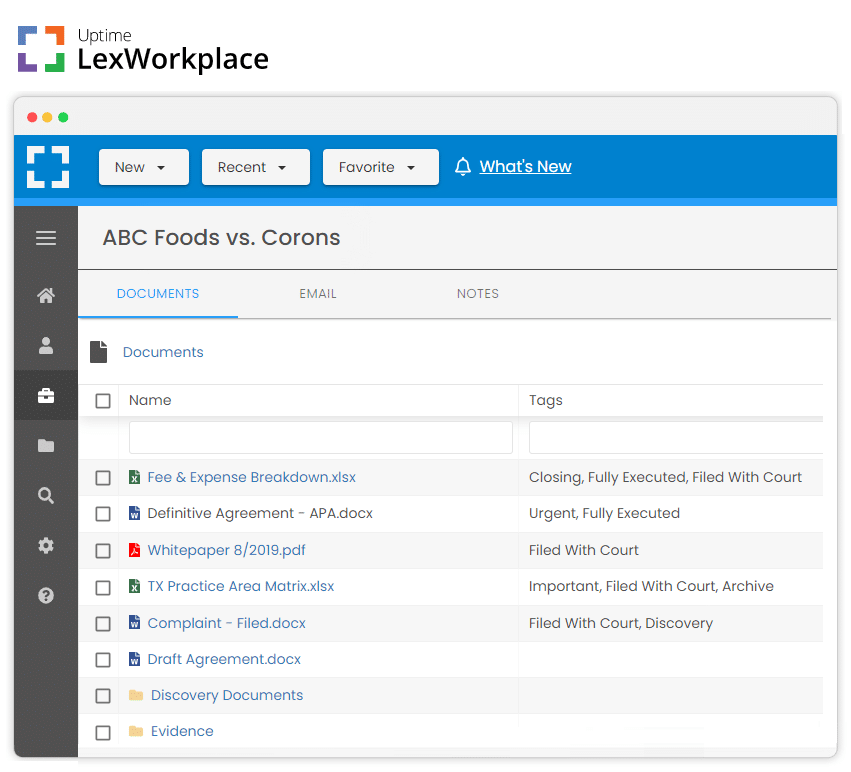The Problem With
Basic Cloud Storage
Basic cloud storage is meant for solos and freelancers, not law firms. It lacks the structure and tools your firm needs to stay on top of matters and documents.

The Problem With Basic Cloud Storage
Watch our short talk on the challenges of basic cloud storage for law firms (and what to do about it).
1. Poor Structure & Organization
Basic cloud storage is just that; you can create folders, put stuff into them… and that’s about it. General-purpose cloud storage lacks the client/matter-centric organization that modern law firms need. Without this law-firm-centricity you’re left with a wild-west of folders (and frustration when everyone doesn’t follow the same organization conventions).
2. Lack of Data Compliance
Many general-purpose cloud storage services will back up and replicate your data overseas, creating significant data sovereignty issues, as well as ethical problems regarding your client-related data. They also lack needed version history and permission management.
3. Lack of Document Management Capabilities
Most basic cloud storage services don’t do much beyond simply storing your data. They lack document management capabilities including comprehensive search, tagging and profiling, version management, email management, check in/out and more.
4. Lack of Email Management
Basic cloud storage services leave you to your own devices when it comes to managing email. Emails are just another kind of document, and need to be stored, organized, searched and manage just like any other document. Basic cloud storage lacks any Outlook integration and email management capabilities.
5. Constant Sync Problems
Basic cloud storage services fundamentally work by trying to sync all of your files across all of your devices. This works OK for individual use or very small teams. Once your team grows past 3 or 4 people, however, things star to fall apart. The service will struggle to keep every device synced up and file conflicts occur more and more.
Graduate to LexWorkplace
Cloud-based Document Management for Law Firms

- Matter-Centric Organization
- Cloud-based Document Management
- Comprehensive Email Management
- Document Version Management
- Bank-Grade Data Security
- Document Tagging & Profiling
- Powerful Document & Email Search
- Office and Outlook integration
- Data Stored Exclusively in the US
- No Data Syncing Issues
- Automatically OCR’s Documents as You Upload Them
Our team can help you move from basic cloud storage into LexWorkplace, an easy-to-use cloud-based Document Management System.
Success Stories
“I love the functionality of LexWorkplace.”
I love LexWorkplace, particularly the ease of organizing all related emails and documents by matter, and that LexWorkplace is cloud-based and can be used from anywhere.
Robert Roseman
Robert D. Roseman, PC
“The organization is great.”
Easy to use and logical even for new hires. The organization of the system is great. ‘Uptime’ is aptly named since we have had no disruptions in over 2 years.
Brad Thies
Thies & Lihn
“Small Firm,Big Help.”
LexWorkplace has been very easy to use and has a very small learning curve–that was big for us. The other products we looked at needed more training than we were willing to spend time on.
Kim Shipman
Osborn Law Group
Frequently Asked Questions
Document management is a kind of software that stores, organizes and provides tools to help your law firm manage its documents. Beyond the basic storage that you’ll find with an on-premise file server, or basic cloud storage services like Dropbox, document management software provides capabilities including full-text search, version management, OCR, document tagging and more.
Document management software provides structure and tools for your firm, your matters and the documents (and email) for each matter. Document Management software such as LexWorkplace helps you manage document versions, find what you’re looking for, tag and categorize documents, organize matters and matter documents, and much more.
Good Document Management software also integrates with the tools you use most, such as Microsoft Office and Outlook.
Document Management software stores, manages documents and email, and does so in a very robust way. Practice Management software, on the other hand, provides contact management, calendars, billing and other “front-office” functions. Practice Management software sometimes includes rudimentary file storage, but almost always lacks the robust functionality of a true Document Management System.
To learn more, read our article on Practice Management vs. Document Management software.
If you’re a law firm, yes. LexWorkplace is the only document management software born in the cloud and built exclusively for law firms. Other document management software is either not cloud-based, crudely cloud-based, or built for the masses (not for law firms).
LexWorkplace starts at $395 / month. For more information, see our plans & pricing.
We’ll handle everything. Rather than farming out your onboarding to a “certified consultant,” we handle moving you LexWorkplace in-house. Our expert onboarding team will work with you to understand your current data, then plan and execute a thoughtful migration of your data to LexWorkplace.
Give us a call! Contact us any time, we’re happy to help you explore legal document management solutions.
DMS stands for, Document Management Software. Document Management software such as LexWorkplace helps you manage document versions, find what you’re looking for, tag and categorize documents, organize matters and matter documents, and much more.
Schedule a Demo
Get in Touch – Speak with a LexWorkplace Specialist Today

“I’ve been a happy Uptime Legal customer for over 10 years, and love their LexWorkplace system.”
Ron Canter
The Law Office of Ron Canter